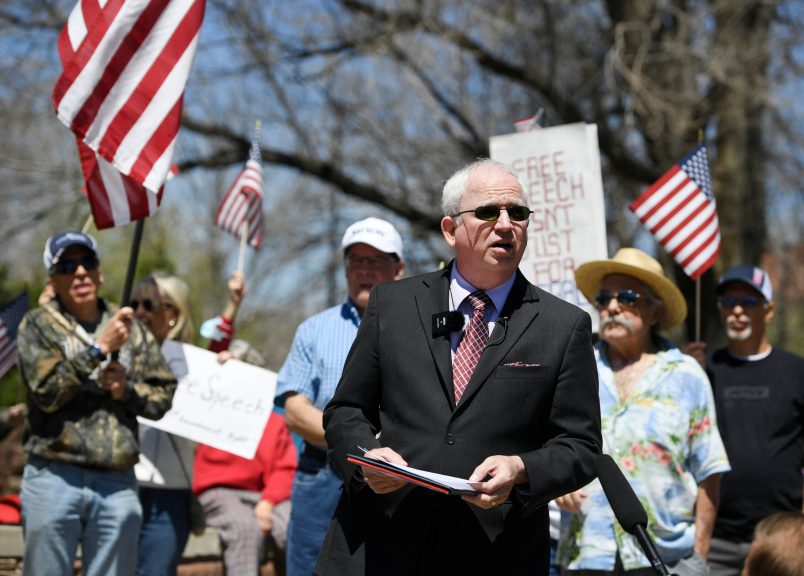The Supreme Court, you’ll know from TPM, is currently considering a case in which Republican legislators from North Carolina argue that they, and no one else, have absolute authority over that state’s federal elections. The state courts don’t, the state governor doesn’t. Only the legislators do, they claim.
For this reason, the legislators argue, they can go ahead and gerrymander to their hearts’ content.
Their argument is a radical reading of the Constitution that has become increasingly in vogue on the right in recent years, known as the “independent state legislature theory,” or the ISLT. As TPM’s Kate Riga has noted, five of the Supreme Court’s six conservatives had expressed something that sounded like enthusiasm for the theory over the last several years. For that reason, when the Court took up the North Carolina case, Moore v. Harper, legal scholars began pounding the alarm.
A powerful profile of Trump lawyer John Eastman in Washington Monthly today helps make clear why. For some adherents of the ISLT (and Eastman is one), the theory isn’t just about gerrymandering. It’s about who gets to decide whether democracy gets to function — whether an election counts, or doesn’t. The theory was an animating force in the Trump election-theft effort, as Eastman makes plain in a conversation with the piece’s author, the legal scholar and journalist Garrett Epps.
“My view … is that when the election is conducted not according to the manner that it was directed by the legislature, it’s an invalid election,” he told Epps.
An invalid election.
Such invalid elections, the Trump lawyers argued in 2020 and early 2021, can simply be thrown out.
Epps provides the context for how this theory was brought to bear as Trump’s lawyers tried (and repeatedly failed) to chuck the 2020 vote.
The core of the allegation, both in the “coup” memos and in the Supreme Court motion, was not that ballot boxes were stuffed with votes by dead or nonexistent voters or that lawful ballots weren’t counted; it was that the state courts and state election boards made decisions about details of the voting—hours in which polling places were open, for example, the number and location of drop boxes, or the formalities necessary for submitting a mail vote—that differed in some way from the way the Trump campaign read the wording of the statutes. In the Eastman theory, only the state legislatures are empowered to make any decisions about voting, regardless of what state constitutions say or what authority state courts and officials have under those state statutes.
The takeaway is clear — that a legal theory before the Supreme Court right now was absolutely essential to Trump’s election-theft effort. It was at its very core. That has not come through as clearly in the media coverage of this case as it should have.
There’s an ironic side-note to Moore v. Harper that Kate’s covered at TPM in recent weeks. During Supreme Court oral arguments in December, even some of the conservative justices seemed a bit skeptical of the North Carolina state legislators’ attempts to advocate for a maximalist version of the ISLT. And so, perhaps for that reason, the North Carolina Republicans went ahead and re-ran the case at the state level, now with a fresh crop of Republicans on the state Supreme Court (North Carolina has partisan judges). The legislators look likely to win, and get the district maps they wanted.
And so the U.S. Supreme Court was left hanging. What should it do with this case that it heard arguments on, but that the lower court, with new judges, is now working on re-deciding. Is the whole thing moot?
No, the good government group Common Cause argued in a brief to the Supreme Court. The justices should go ahead and decide what they think of the ISLT now. They might not arrive at the answer that Common Cause, a left-of-center group, is hoping for — but it would still be good to know where the justices stand, its lawyers ominously reasoned.
“This Court should not wait until this question comes before it on an emergency basis in the lead up to the 2024 election cycle,” Common Cause’s lawyers wrote. “The question presented is fully briefed, thoroughly argued, and ripe for decision. This Court is the only forum that can definitively resolve it and provide guidance to state legislatures and state courts across the country.”
The coup plotters will still be around in 2024. We may as well know what we’re facing.
The Best Of TPM Today
Here’s what you should read this evening:
Focusing on Right-Wing Radicalism & Terrorism
Federal Judge Orders Pence To Testify About Convos With Trump Leading Up To Insurrection
Georgia Joins A Cadre of Red States Seeking Control Over Local DAs
Senate Chaplain Issues Pointed Plea For Action On Guns: Time To Move ‘Beyond Thoughts And Prayers’
The Many Levels Of McCarthy’s Newest Debt Ceiling Nonsense
Yesterday’s Most Read Story
DOJ Presses To Immediately Get Its Hands On Peter Navarro’s Encrypted Emails — Kaila Philo
What We Are Reading
U.S. charges FTX’s Bankman-Fried with paying $40 mln Chinese bribe — Reuters
Activist group led by Ginni Thomas received nearly $600,000 in anonymous donations — Washington Post
No Labels’ Pitch to Donors Pretends Joe Biden Doesn’t Exist — The New Republic






